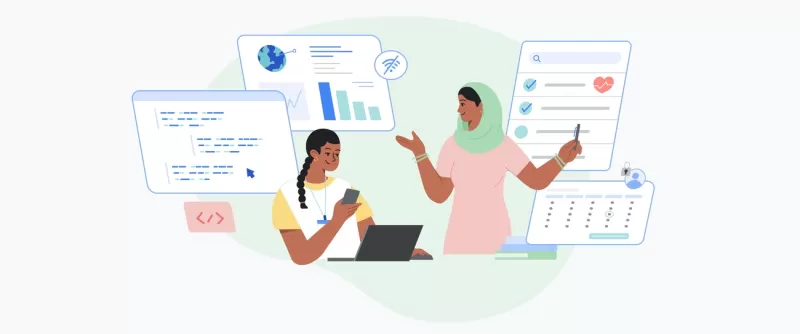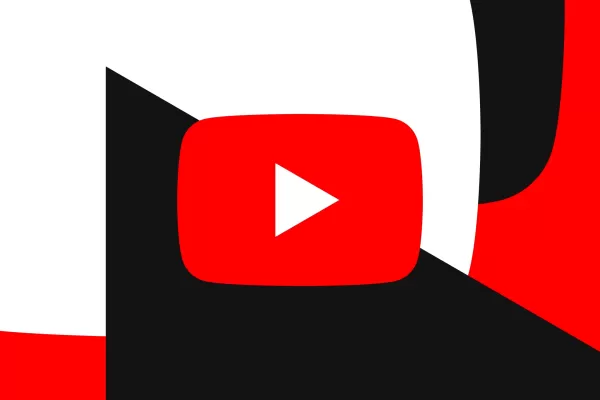Open Health Stack: 5 Solutions for Healthcare Gaps

More than half of the world's population doesn't have access to basic health services. But there's hope on the horizon, thanks to mobile technology. In 2023, we launched the Open Health Stack (OHS), a collection of open-source tools designed to tackle the common challenges developers face in global health. OHS cuts down on development time and helps developers around the world embrace modern digital health standards, enabling them to create advanced digital health solutions. These solutions are secure and can work offline, which is crucial for healthcare workers in areas where internet connectivity is spotty.
Since we kicked off OHS, we've made some big strides in supporting the global digital health community and making a real difference in underserved areas. We've partnered with over 20 early adopters and have seen OHS-powered health solutions deployed across Africa, South Asia, and Southeast Asia. Here's how we're helping digital health developers worldwide with OHS:
1. Speeding Up Development and Unlocking Insights
Developers are using OHS to build digital health solutions that provide valuable data insights and analytics to healthcare decision-makers. Take Ona, for example—they've shifted from paper records to digital solutions with OHS, speeding up their app development and adopting interoperable data standards like HL7 FHIR. This has helped healthcare workers and supervisors deliver better care in underserved communities.
Similarly, mPower and ITECH-DIGI have used OHS tools to enhance their healthcare solutions. mPower has improved service quality in Bangladesh by accelerating development and scalability, while ITECH-DIGI has used analytics tools for better data visualization and decision-making within their electronic medical records system.
2. Sharing Best Practices and Advancing Knowledge
OHS has played a big role in spreading awareness and knowledge about interoperability standards and open technologies among global health developers. We recently teamed up with the WHO and a network of partners to host the first Open Digital Health Summit from December 1-3, 2024. Over 300 developers and technical architects from 45 countries came together to tackle the knowledge and skills gaps needed to speed up standards-based digital health transformation.
Attendees at the Open Digital Health Summit in December 2024
3. Boosting Developer Skills with Hands-On Workshops
We've held numerous OHS workshops around the world for hundreds of developers. We worked with Kabarak University in Kenya to run bootcamps for IT students and up-and-coming innovators, teaching them the key concepts and tools needed to build digital health apps. In India, we held a developer-focused workshop at the country's largest digital health conference, offering hands-on coding and building sessions on OHS components.
4. Exploring AI's Potential
While OHS provides the technical backbone for digital health solutions, there's also a lot of potential in AI. Google has already released a set of open weight models called Health AI Developer Foundations, which help developers build AI models for healthcare apps more easily. The OHS team is working with the developer community to understand their needs and create the infrastructure that will make it easier for them to build AI-powered solutions soon.
5. Building a Thriving OHS Community
Based on feedback from our growing global community of developers, we've added new technical features to OHS to help developers build faster and more securely. We've also launched resources like an educational video series to help developers get started with OHS. Since its launch, OHS has been a community-driven initiative, and we're thrilled to acknowledge the contributions of the many developers who keep OHS going strong. As Khyati Vyas from ArguSoft India, an OHS contributor, put it, "Working on Open Health Stack has been an eye-opening experience for me. It's inspiring to collaborate on an open-source platform that empowers innovation and improves health data accessibility for better patient outcomes."
Looking ahead to 2025, we're excited to keep working with partners and the global digital health ecosystem to expand OHS's reach worldwide. Our ultimate goal with OHS is to lower the barriers for developers and innovators to create next-generation digital health solutions and improve care for people everywhere. To get involved with OHS, learn more here.
Related article
 Trump Prioritizes AI Growth Over Regulation in Race to Outpace China
The Trump administration unveiled its landmark AI Action Plan on Wednesday, marking a decisive break from the Biden administration's risk-averse AI policies. The ambitious blueprint prioritizes aggressive infrastructure development, sweeping regulato
Trump Prioritizes AI Growth Over Regulation in Race to Outpace China
The Trump administration unveiled its landmark AI Action Plan on Wednesday, marking a decisive break from the Biden administration's risk-averse AI policies. The ambitious blueprint prioritizes aggressive infrastructure development, sweeping regulato
 YouTube Integrates Veo 3 AI Video Tool Directly Into Shorts Platform
YouTube Shorts to Feature Veo 3 AI Video Model This SummerYouTube CEO Neal Mohan revealed during his Cannes Lions keynote that the platform's cutting-edge Veo 3 AI video generation technology will debut on YouTube Shorts later this summer. This follo
YouTube Integrates Veo 3 AI Video Tool Directly Into Shorts Platform
YouTube Shorts to Feature Veo 3 AI Video Model This SummerYouTube CEO Neal Mohan revealed during his Cannes Lions keynote that the platform's cutting-edge Veo 3 AI video generation technology will debut on YouTube Shorts later this summer. This follo
 Google Cloud Powers Breakthroughs in Scientific Research and Discovery
The digital revolution is transforming scientific methodologies through unprecedented computational capabilities. Cutting-edge technologies now augment both theoretical frameworks and laboratory experiments, propelling breakthroughs across discipline
Comments (31)
0/200
Google Cloud Powers Breakthroughs in Scientific Research and Discovery
The digital revolution is transforming scientific methodologies through unprecedented computational capabilities. Cutting-edge technologies now augment both theoretical frameworks and laboratory experiments, propelling breakthroughs across discipline
Comments (31)
0/200
![GaryLewis]() GaryLewis
GaryLewis
 August 13, 2025 at 3:01:00 AM EDT
August 13, 2025 at 3:01:00 AM EDT
The Open Health Stack sounds like a game-changer! Using mobile tech to bridge healthcare gaps is such a smart move. I’m curious—how fast can these tools scale to reach remote areas? 🤔


 0
0
![JerryMoore]() JerryMoore
JerryMoore
 April 18, 2025 at 3:52:18 PM EDT
April 18, 2025 at 3:52:18 PM EDT
오픈 헬스 스택은 정말 구세주예요! 의료 격차를 줄이는 데 도움이 되다니 놀랍네요. 도구는 사용하기 쉬워요, 하지만 초보자를 위한 더 자세한 지침이 있었으면 좋겠어요. 그래도 훌륭한 시도예요! 👍


 0
0
![JimmyJohnson]() JimmyJohnson
JimmyJohnson
 April 18, 2025 at 5:08:39 AM EDT
April 18, 2025 at 5:08:39 AM EDT
O Open Health Stack é um salva-vidas! É incrível como está ajudando a preencher as lacunas na saúde. As ferramentas são fáceis de usar, mas eu gostaria que houvesse instruções mais detalhadas para iniciantes. Ainda assim, é uma ótima iniciativa! 👍


 0
0
![JackMartin]() JackMartin
JackMartin
 April 17, 2025 at 2:26:28 PM EDT
April 17, 2025 at 2:26:28 PM EDT
オープンヘルススタックは素晴らしいですね!開発者が直面する課題を解決するために、モバイル技術がどれだけ役立つか驚きました。ただ、もっと多くの言語に対応してほしいです。世界中の人々に届くといいですね!🌍💡


 0
0
![NicholasSanchez]() NicholasSanchez
NicholasSanchez
 April 17, 2025 at 8:42:22 AM EDT
April 17, 2025 at 8:42:22 AM EDT
오픈 헬스 스택 덕분에 의료 격차를 메울 수 있다는 게 정말 대단해요! 모바일 기술이 이렇게 유용할 줄은 몰랐어요. 다만, 더 많은 언어를 지원해주면 좋겠어요. 전 세계 사람들에게 도움이 될 거예요! 🌍💡


 0
0
![RobertSanchez]() RobertSanchez
RobertSanchez
 April 16, 2025 at 3:51:39 PM EDT
April 16, 2025 at 3:51:39 PM EDT
Open Health Stack is a lifesaver! It's amazing how it's helping to bridge healthcare gaps. The tools are easy to use, but I wish there were more detailed instructions for beginners. Still, it's a great initiative! 👍


 0
0

More than half of the world's population doesn't have access to basic health services. But there's hope on the horizon, thanks to mobile technology. In 2023, we launched the Open Health Stack (OHS), a collection of open-source tools designed to tackle the common challenges developers face in global health. OHS cuts down on development time and helps developers around the world embrace modern digital health standards, enabling them to create advanced digital health solutions. These solutions are secure and can work offline, which is crucial for healthcare workers in areas where internet connectivity is spotty.
Since we kicked off OHS, we've made some big strides in supporting the global digital health community and making a real difference in underserved areas. We've partnered with over 20 early adopters and have seen OHS-powered health solutions deployed across Africa, South Asia, and Southeast Asia. Here's how we're helping digital health developers worldwide with OHS:
1. Speeding Up Development and Unlocking Insights
Developers are using OHS to build digital health solutions that provide valuable data insights and analytics to healthcare decision-makers. Take Ona, for example—they've shifted from paper records to digital solutions with OHS, speeding up their app development and adopting interoperable data standards like HL7 FHIR. This has helped healthcare workers and supervisors deliver better care in underserved communities.
Similarly, mPower and ITECH-DIGI have used OHS tools to enhance their healthcare solutions. mPower has improved service quality in Bangladesh by accelerating development and scalability, while ITECH-DIGI has used analytics tools for better data visualization and decision-making within their electronic medical records system.
2. Sharing Best Practices and Advancing Knowledge
OHS has played a big role in spreading awareness and knowledge about interoperability standards and open technologies among global health developers. We recently teamed up with the WHO and a network of partners to host the first Open Digital Health Summit from December 1-3, 2024. Over 300 developers and technical architects from 45 countries came together to tackle the knowledge and skills gaps needed to speed up standards-based digital health transformation.
Attendees at the Open Digital Health Summit in December 2024
3. Boosting Developer Skills with Hands-On Workshops
We've held numerous OHS workshops around the world for hundreds of developers. We worked with Kabarak University in Kenya to run bootcamps for IT students and up-and-coming innovators, teaching them the key concepts and tools needed to build digital health apps. In India, we held a developer-focused workshop at the country's largest digital health conference, offering hands-on coding and building sessions on OHS components.
4. Exploring AI's Potential
While OHS provides the technical backbone for digital health solutions, there's also a lot of potential in AI. Google has already released a set of open weight models called Health AI Developer Foundations, which help developers build AI models for healthcare apps more easily. The OHS team is working with the developer community to understand their needs and create the infrastructure that will make it easier for them to build AI-powered solutions soon.
5. Building a Thriving OHS Community
Based on feedback from our growing global community of developers, we've added new technical features to OHS to help developers build faster and more securely. We've also launched resources like an educational video series to help developers get started with OHS. Since its launch, OHS has been a community-driven initiative, and we're thrilled to acknowledge the contributions of the many developers who keep OHS going strong. As Khyati Vyas from ArguSoft India, an OHS contributor, put it, "Working on Open Health Stack has been an eye-opening experience for me. It's inspiring to collaborate on an open-source platform that empowers innovation and improves health data accessibility for better patient outcomes."
Looking ahead to 2025, we're excited to keep working with partners and the global digital health ecosystem to expand OHS's reach worldwide. Our ultimate goal with OHS is to lower the barriers for developers and innovators to create next-generation digital health solutions and improve care for people everywhere. To get involved with OHS, learn more here.
 Trump Prioritizes AI Growth Over Regulation in Race to Outpace China
The Trump administration unveiled its landmark AI Action Plan on Wednesday, marking a decisive break from the Biden administration's risk-averse AI policies. The ambitious blueprint prioritizes aggressive infrastructure development, sweeping regulato
Trump Prioritizes AI Growth Over Regulation in Race to Outpace China
The Trump administration unveiled its landmark AI Action Plan on Wednesday, marking a decisive break from the Biden administration's risk-averse AI policies. The ambitious blueprint prioritizes aggressive infrastructure development, sweeping regulato
 YouTube Integrates Veo 3 AI Video Tool Directly Into Shorts Platform
YouTube Shorts to Feature Veo 3 AI Video Model This SummerYouTube CEO Neal Mohan revealed during his Cannes Lions keynote that the platform's cutting-edge Veo 3 AI video generation technology will debut on YouTube Shorts later this summer. This follo
YouTube Integrates Veo 3 AI Video Tool Directly Into Shorts Platform
YouTube Shorts to Feature Veo 3 AI Video Model This SummerYouTube CEO Neal Mohan revealed during his Cannes Lions keynote that the platform's cutting-edge Veo 3 AI video generation technology will debut on YouTube Shorts later this summer. This follo
 Google Cloud Powers Breakthroughs in Scientific Research and Discovery
The digital revolution is transforming scientific methodologies through unprecedented computational capabilities. Cutting-edge technologies now augment both theoretical frameworks and laboratory experiments, propelling breakthroughs across discipline
Google Cloud Powers Breakthroughs in Scientific Research and Discovery
The digital revolution is transforming scientific methodologies through unprecedented computational capabilities. Cutting-edge technologies now augment both theoretical frameworks and laboratory experiments, propelling breakthroughs across discipline
 August 13, 2025 at 3:01:00 AM EDT
August 13, 2025 at 3:01:00 AM EDT
The Open Health Stack sounds like a game-changer! Using mobile tech to bridge healthcare gaps is such a smart move. I’m curious—how fast can these tools scale to reach remote areas? 🤔


 0
0
 April 18, 2025 at 3:52:18 PM EDT
April 18, 2025 at 3:52:18 PM EDT
오픈 헬스 스택은 정말 구세주예요! 의료 격차를 줄이는 데 도움이 되다니 놀랍네요. 도구는 사용하기 쉬워요, 하지만 초보자를 위한 더 자세한 지침이 있었으면 좋겠어요. 그래도 훌륭한 시도예요! 👍


 0
0
 April 18, 2025 at 5:08:39 AM EDT
April 18, 2025 at 5:08:39 AM EDT
O Open Health Stack é um salva-vidas! É incrível como está ajudando a preencher as lacunas na saúde. As ferramentas são fáceis de usar, mas eu gostaria que houvesse instruções mais detalhadas para iniciantes. Ainda assim, é uma ótima iniciativa! 👍


 0
0
 April 17, 2025 at 2:26:28 PM EDT
April 17, 2025 at 2:26:28 PM EDT
オープンヘルススタックは素晴らしいですね!開発者が直面する課題を解決するために、モバイル技術がどれだけ役立つか驚きました。ただ、もっと多くの言語に対応してほしいです。世界中の人々に届くといいですね!🌍💡


 0
0
 April 17, 2025 at 8:42:22 AM EDT
April 17, 2025 at 8:42:22 AM EDT
오픈 헬스 스택 덕분에 의료 격차를 메울 수 있다는 게 정말 대단해요! 모바일 기술이 이렇게 유용할 줄은 몰랐어요. 다만, 더 많은 언어를 지원해주면 좋겠어요. 전 세계 사람들에게 도움이 될 거예요! 🌍💡


 0
0
 April 16, 2025 at 3:51:39 PM EDT
April 16, 2025 at 3:51:39 PM EDT
Open Health Stack is a lifesaver! It's amazing how it's helping to bridge healthcare gaps. The tools are easy to use, but I wish there were more detailed instructions for beginners. Still, it's a great initiative! 👍


 0
0





























